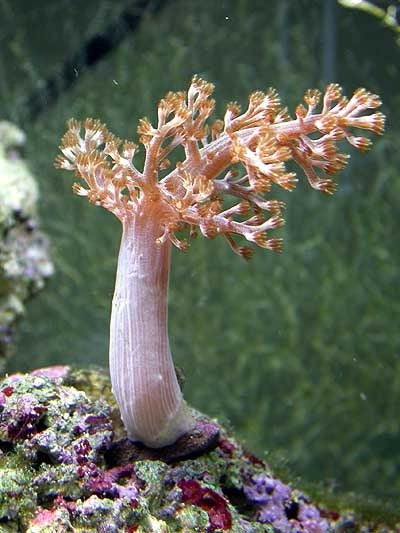Coralreef Store
Capnella spp. (Kenya)
Capnella spp. (Kenya)
- Indo-Pacific
- Easy to Moderate Care Level
- For Beginners to Intermediate Hobbyists
- Low to Moderate Placement in Reef Tank
Capnella spp., commonly known as Kenya Tree Coral, is a soft coral species in the family Alcyoniidae. Native to the Indo-Pacific, it is one of the most popular soft corals for reef tanks due to its relatively easy care requirements and striking appearance. The coral gets its name from its tree-like structure, with a branching trunk and polyps that give it a "tree" appearance when fully extended.
The polyps of Capnella spp. are small, typically translucent or light-colored, and extend from the central stem, forming a bushy or tree-like structure. Kenya Tree Coral can vary in color, from shades of tan to light pink or green, depending on the lighting and water quality.
This coral is a filter feeder, relying on plankton and organic particles suspended in the water for nourishment. It is also known for its ability to reproduce quickly and is one of the more resilient corals in an aquarium setting. However, it can sometimes grow too quickly and spread beyond its intended space in the tank.
Placement in the Tank
Kenya Tree Corals thrive under moderate lighting. While they can tolerate some direct light, too much intensity may cause them stress. Moderate lighting that simulates natural reef conditions is ideal for growth. This species prefers moderate water flow. Gentle flow allows the polyps to extend fully, while strong currents can cause them to retract or damage the coral. Moderate to gentle water flow ensures proper feeding and overall health. As Capnella spp. can grow quickly and spread, it’s important to give them enough space to grow and expand. Avoid placing them too close to other corals, as they can be slightly aggressive toward neighboring corals if they come into direct contact.
Water Parameters
Stable water parameters are essential for the health and growth of Capnella spp.:
Temperature: 24°C to 28°C (75°F to 82°F).
Salinity: 1.023–1.025 specific gravity.
pH: Around 8.1 to 8.4.
Alkalinity: 8-12 dKH.
Calcium: 400-450 ppm.
Feeding
Capnella spp. is a filter feeder, obtaining its nutrients from plankton and other organic matter in the water column. In a well-established reef tank, this coral can gather enough food naturally. However, if the tank has low nutrient levels, you can supplement their diet with liquid coral food or plankton a couple of times per week. While Kenya Tree Coral doesn’t require direct feeding for survival, occasional feeding can encourage healthy growth and improve overall condition.
Maintenance and Care
Consistent water quality is essential for the health of Capnella spp. Regular water changes (10-15% weekly) help maintain stable water parameters. Proper filtration is crucial to avoid water contamination and ensure that the coral thrives. Since Kenya Tree Coral grows quickly, pruning may be required to prevent it from overtaking other corals. You can trim back overgrown sections using a coral-safe tool. Be careful not to damage the polyps during pruning. Keep an eye on pests such as nudibranchs or predatory snails, which may feed on Capnella spp. If you notice signs of damage or discoloration on the polyps, check for pests. Manual removal of any pests may be necessary if you detect an infestation.
Compatibility
Capnella spp. is generally a peaceful coral, but it can be slightly aggressive toward other species if placed too closely. It’s best to provide enough space between Kenya Tree Coral and other corals, especially more delicate or slow-growing species. This coral is highly compatible with other soft corals, though it should be monitored for overgrowth.
By providing stable water conditions, appropriate lighting, and moderate water flow, Capnella spp. can thrive in your reef tank. This hardy coral is a great choice for hobbyists looking for an attractive and easy-to-care-for coral that can quickly become a centerpiece of your tank.
Share


